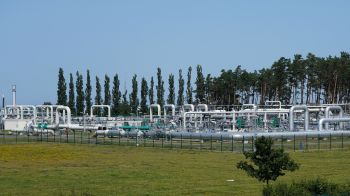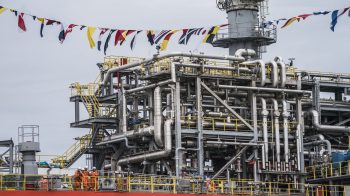EU looking to end energy addition
Share Now on:
EU looking to end energy addition
KAI RYSSDAL: European leaders are meeting in Brussels today. There are 25 countries in the European Union. And all of them need to get on the same political page. Won’t be easy. There are questions about foreign policy. Economic policy. And energy. Specifically, where it’s gonna come from. From the Marketplace European Desk in London, Stephen Beard reports.
STEPHEN BEARD: Last winter a shiver ran down European spines. In a dispute over prices, Russia cut the natural gas that it was pumping to Ukraine. But that also cut supplies to European Union countries using the same pipeline:
DIETER HELM: That was the wake-up call for the Europeans to realize that they were pretty vulnerable on the basis of a small number of very large pipes.
Dieter Helm of Oxford University says Europeans derive from Russia more than a quarter of their natural gas. For the Germans, it’s 40 percent.
HELM: That’s a fairly exposed position to be in. And the experience just after Christmas with Ukraine has left people feeling, at best, pretty nervous.
“Traumatized” might be a better way of putting it, says Chris Skrebowski of Petroleum Review magazine.
CHRIS SKREBOWSKI: Suddenly this rather blythe assumption that Russia had infinite amounts of gas and would supply it reliably was called into question.
Just the fact that it was prepared to cut off supplies was bad enough. Even more alarming was the fear that this may have been politcal. That the Kremlin was punishing Ukraine for seeking to throw off Russia’s influence. For some, the incident confirmed President Putin’s dictatorial — even imperial — tendencies.
SKREBOWSKI: There’s a certain amount of circumstantial evidence that it might be just that. His wife gave him a reproduction of a Tsarist crown for his birthday before last, which in Russian terms is a very symbolic sort of act.
Some do seriously believe that Putin would like to turn Europe into a client state through dependence on Russian energy. The Europeans are now casting around rather desperately for aletrnative supplies. One possibility, says Nick Redman of the Economist Intelligence Unit, is LNG or Liquefied Natural Gas. With this technology, countries don’t have to be connected by pipeline. The gas is turned into liquid and transported by sea.
NICK REDMAN: The key for the Europeans if they’re concerned about supply security is to develop the infrastructure so that they’re not reliant on a single supplier, which means basically more LNG terminals and more encouragement for LNG producers in different parts of the world.
There are now dozens of actual and potential LNG suppliers all over the planet: Among them, Norway, Algeria, Indonesia and Yemen. Dieter Helm also believes LNG is the way to go.
HELM: The more uncertain you are about what the Russians might do, the more LNG you build. The more LNG you build, the less they’re actually going to be able to exploit their monopoly.
He advocates a string of measures to improve Europe’s energry security. They include a huge network of gas reserve storage tanks. And there’s the plan under discussion at today’s summit to turn the 25-member states into a single market for electricity and gas. The EU would then deal with the Russians as a single, powerful customer.
HELM: All of that lot is quite sensible anyway. The question is, is this a big enough crisis yet to get people to do anything about it.
If it isn’t yet, he says, it will be pretty soon.
In London, this is Stephen Beard for Marketplace.
There’s a lot happening in the world. Through it all, Marketplace is here for you.
You rely on Marketplace to break down the world’s events and tell you how it affects you in a fact-based, approachable way. We rely on your financial support to keep making that possible.
Your donation today powers the independent journalism that you rely on. For just $5/month, you can help sustain Marketplace so we can keep reporting on the things that matter to you.


















